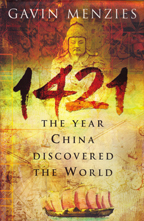Vetting 1421 for accuracy by Chinese Institutions
As well as consulting the historians mentioned in the Acknowledgements section of the book, in October, November and December 2002, the author visited Nanjing, Shanghai, Tai Cang, Kunming and Beijing and presented 100 copies of his book to professors and historians at the institutions listed below, together with his latest synopses of evidence translated into Chinese.
(i) Chinese Academy of Sciences
(ii) Chinese Academy of Social Sciences
(iii) National Museum of Chinese History
(iv) History Institute of Chinese Academy of Social Sciences
(v) Chinese Society on Ming Dynasty History
(vi) Ming Division of History Institute of China
(vii) Chinese Society of Histories of China’s Foreign Relations
(viii) Chinese Institute for Marine Affairs
(ix) C. S. Name Consultancy Group
(x) C. M. H. I. A. Ocean Association
(xi) C. S.O. Military Oceanography Committee
(xii) Association of Studies of Ming Dynasty
(xiii) Overseas Chinese Affairs Office of the State Council of the People’s Republic of China
(xiv) History and Natural Science and Technology Institute of Chinese Academy of Sciences
(xv) Geographical Studies Institute
(xvi) Beijing Academy of Social Sciences
(xvii) Ministry of Transport Research Institute
(xviii) Yunnan University, Kunming
(xix) Peking University, Beijing
(xx) Nanjing University
(xxi) Chinese Society for Historians of China’s Foreign Relations
(xxii) Chinese American Oceanic and Atmospheric Association
(xiii) Shanghai Society for International Relations.
(xxiv) Shanghai Centre for Strategic and International Societies
(xxv) Zheng He Memorial Hall of Liu He (Tai Cang)
(xxvi) Chinese Marine History Researchers’ Association
(xxvii) Zheng He Research Association
(xxviii) Navy Command College of the People’s Republic of China
(xxix) National Cheng Kung University
(xxx) Zheng He family archives
(xxxi) Tai Cang Museum
(xxxii) Zheng He’s Museum (Mausoleum) Nanjing
(xxxiii) Zheng He’s Museum (birthplace), Kunming
(xxxiv) Cheng He Navigation Research Foundation
(xxxv) Jiantong University, Shanghai
(xxxvi) China Institute for Ethnic Chinese History Studies.
This evidence has been carefully considered by more than 200 experts. Of these, approximately 85% accept the author’s argument that Chinese fleets discovered the New World before Europeans. About 15% disagree with the author on important issues – details will be provided to any researcher who requests them.


